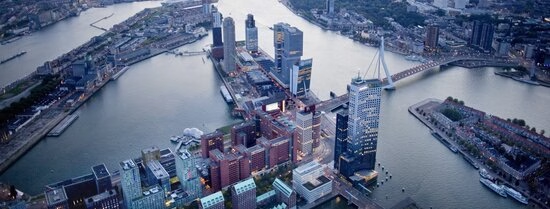Helping people from WW to find a job that suits them. In short, that is what WW@WORK does. What started as a temporary project from the municipality of Rotterdam has proved successful for several parties. Manager Astrid van Aalst (38) and cooperating coordinator Herman Klapdoor (67) speak on the unique approach of WW@WORK and their collaboration with professor Semiha Denktaş of BIG’R.

Both Astrid and Hermann began their career in education before working for the municipality of Rotterdam. A switch that wasn’t too drastic, according to Herman: “In education, you guide people towards a greater goal. We do that at WW@WORK as well.” Astrid and Hermann gain satisfaction from helping others or, even better, making them happy.
From WW to Work
WW@WORK is intended for the residents of Rotterdam whose WW benefit ends within six months and have not yet found a new job. In addition to the help from the Dutch employee insurance implementation institute (Uitvoeringsinstituut Werknemersverzekeringen, UWV), you can make use of the guidance team at WW@WORK. The municipality of Rotterdam wants to use this guidance to help the residents find a new job and prevent them from entering the social welfare system. Those who apply will receive help and advice on successful job applications, training sessions in which they can participate (e.g. application skills), and weekly job offers. The strength lies in the personal guidance of the advisor. Astrid: “We want to build a relationship. We do that through weekly or even daily contact with the same advisor. This way, the job seeker knows from day one whom he or she can turn to. It allows our advisor to get familiar with someone and to guide them from there, to suitable work.”

A positive, motivational approach
WW@WORK works closely with the UWV. Given that participation in the programme is voluntary, this collaboration is essential for Astrid’s team, because participants come in through an invitation from the UWV. Consequently, a lot depends on how the invitation is written. This is where collaboration with the Erasmus School of Social and Behavioral Sciences comes into play. Astrid: “The researchers from the Behavioural Insights Group Rotterdam (BIG’R) have helped us to incorporate nudging: a positive way of influencing behaviour. We wanted to make sure that the letter sent by the UWV would invite people to participate in WW@ WORK in an approachable and positive way.” Herman adds: “The trick is to word your message in such a way that people think: ‘I don’t want to miss this!’” Astrid and Herman apply that principle of having a positive and motivational approach throughout their work. “If you are positive and create a good atmosphere, this calls for a positive attitude among participants. That is when the project becomes a gift they can unwrap, and in fact, it is!” says Herman.
Ambitious
“We wouldn’t have managed this project without such a driven and creative team,” says Herman. He will soon say his goodbyes, as he approaches retirement. “I have appreciated my interaction with this young team! My colleagues give me a lot of energy every day, and for me, that means that I can be of value in this work. This is a team that has trust in one another, and that is really important. I hope that Astrid and her colleagues can maintain that atmosphere.” Astrid nods understandingly: “When you have freedom and trust, cooperation grows.” Although WW@WORK started as a temporary project, she is ambitious about the future: “We have shown what we can do for the Rotterdammers looking for work. We have achieved this thanks to good cooperation between UWV and the municipality of Rotterdam with the help of BIG’R. We want to hold onto this collaboration and expand it further.”

BIG’R
With the help of research in practice, the Behavioural Insights Group Rotterdam (BIG’R) transforms Rotterdam’s dilemmas into effective municipal policies. The cofounder is Semiha Denktaş (47), professor and vice-dean for research at ESSB. “The strength of BIG’R is that the team consists of behavioural researchers, policymakers, and specialists. They tackle an issue, together. I am very enthusiastic about this, because through this working method, science is directly at the service of society: it is a living lab.”
Nudging
The first experiment for BIG’R was very concrete. At Nesselande in Rotterdam, people set their means of transport too close to the beach, making it difficult for emergency services to reach that area. How do you tackle a problem like this? Denktaş: “For BIG’R, this was a great case for making immediate adjustments, based on interviews and observations, to make the area safer. We achieved this with the help of nudging. Nudging is a positive way of influencing behaviour. You make it easy for people to change unwanted behaviour. Think of the beeps when you forget to fasten your seatbelt. As a behavioural scientist, I found it fantastic to see how we could directly turn our knowledge into practice in this experiment!”
- Professor

